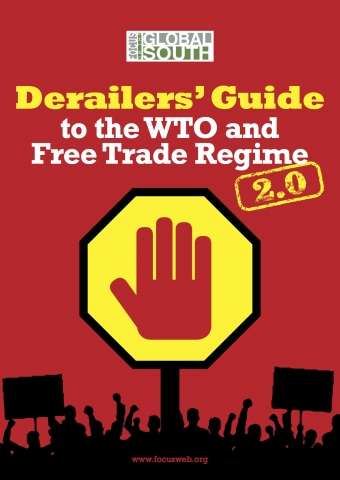In November 2005, amidst preparations for heightening campaigns and actions across the globe in the lead up to the Hong Kong Ministerial Meeting of the World Trade Organization (WTO), Focus on the Global South published a little campaign handbook called the Derailers’ Guide to the WTO.
The guide was put together to help campaigners navigate the intricacies of proposed trade agreements and discuss the key issues underlying negotiations in the main areas of agriculture, non-agricultural market access (NAMA), and services. Cutting through the technical jargon and ‘trade speak’, we examined how these talks would affect people’s lives and livelihoods and the pursuit of equitable development.
The guide also dissected the political dynamics among the country groupings to help the readers understand the positions being taken and whose interests were driving the negotiations.
Even then, while considerable attention was given to the negotiations inside the WTO, there was already a strong anti-WTO position among civil society campaigners and activists. To derail the WTO, as the guide clarified, “is an active strategy to shut down the WTO by preventing consensus in its negotiations,” because the “decision by consensus” was, as Walden Bello had had described it, WTO’s ‘Achilles heel’. The agenda was never to reform the WTO (see the article Why one cannot turn the WTO around).
The target of the actions in 2005 was the Hong Kong Ministerial which took place in December that year. Hong Kong is still remembered today, especially among Asian movements, as a milestone in social movement actions against free trade and corporate globalization. “Down Down WTO” became the rallying cry of thousands of activists who marched on the streets of Wan Chai during the 17th December people’s march.
Despite the protests, however, the high level government meeting produced the Hong Kong Ministerial Declaration which represented a collective reaffirmation of faith in the multilateral trading system by governments and charted the direction for continuing the Doha talks.
The momentum achieved in Hong Kong however was not sustained for long. The disagreements within countries intensified and the talks have since been in a state of perpetual stalemate. That the WTO negotiations have ‘collapsed’ has become a common view.
Since Hong Kong, the succeeding meetings have been moved to Geneva, the WTO’s home turf, as a better way to direct the talks, and perhaps insulate them from noisy protests. When the so called mini-ministerial in Geneva in 2008 collapsed, many free trade partisans were ready to throw in the towel on the Doha round, and there were serious doubts on the credibility of WTO itself.
To shore up credibility, several attempts have since been made to revive the talks and steer the Doha round to conclusion. In 2009, then WTO Director General Lamy harped on the “stabilizing role of the WTO amid economic crisis.” In 2011, sensing political momentum for charting a new way forward towards conclusion of the Doha round, the Chair of the Conference Nigerian Trade and Investment Minister Olusegun Aganga issued the outcome document ‘Elements for Political Guidance’ which would be a yardstick of the WTO’s political agenda in the lead up to Bali 2013. The agenda zeroed in on the need to conclude a provisional agreement or definitive agreements in certain areas ahead of the full conclusion of the single undertaking. It also focused on the need to explore new negotiating approaches. (See Doha Scorecard: From Hong Kong to Bali)
A central part of the agenda now being pushed by the United States is to bring to the WTO the high standards of liberalization particularly in the areas of intellectual property rights and investments, which have been established under so called ‘New Generation FTAs’. (See New Generation FTAs)
From 3-6 December 2013, the 9th Ministerial Conference (MC9) of the WTO will be held in Bali, Indonesia. The Bali Ministerial will be the first time in eight years since Hong Kong that the conference will be held outside Geneva. The Bali Ministerial is significant for a number of reasons. First, it aims to conclude the Bali Package or early harvest package of agreements on a number of key proposals (see Bali Package). An early harvest agreement in Bali can breathe new life to the dying Doha talks, or it can set it aside permanently in order to pave the way for new, more ambitious talks. Second, Bali is envisioned as a key moment for pushing even higher standards of liberalization in the name of making the WTO a 21st century institution.
When the first edition of the Derailers’ Guide was published in 2005, the resistance to the WTO was still on a very high note. Across the globe, the efforts of various sectors and groups converged around campaign platforms and coalitions that spearheaded actions and mobilizations against the WTO. The guide was intended then to contribute towards strengthening these campaigns by putting forward suggestions for concrete actions at the local, national, and global levels. Over the years however, the attention and energies of movements have shifted away from the WTO and towards more urgent concerns like the bilateral trade and investment agreements that have surged over the years, and other pressing global concerns like climate change.
As we come closer to the Bali Ministerial in December, there is a need to re-energize the campaign on the WTO and its free trade agenda. We need to consolidate our efforts in order to prevent an agreement in Bali and push back the agenda to strengthen the WTO beyond Bali.





![[IN PHOTOS] In Defense of Human Rights and Dignity Movement (iDEFEND) Mobilization on the fourth State of the Nation Address (SONA) of Ferdinand Marcos, Jr.](https://focusweb.org/wp-content/uploads/2025/07/1-150x150.jpg)

